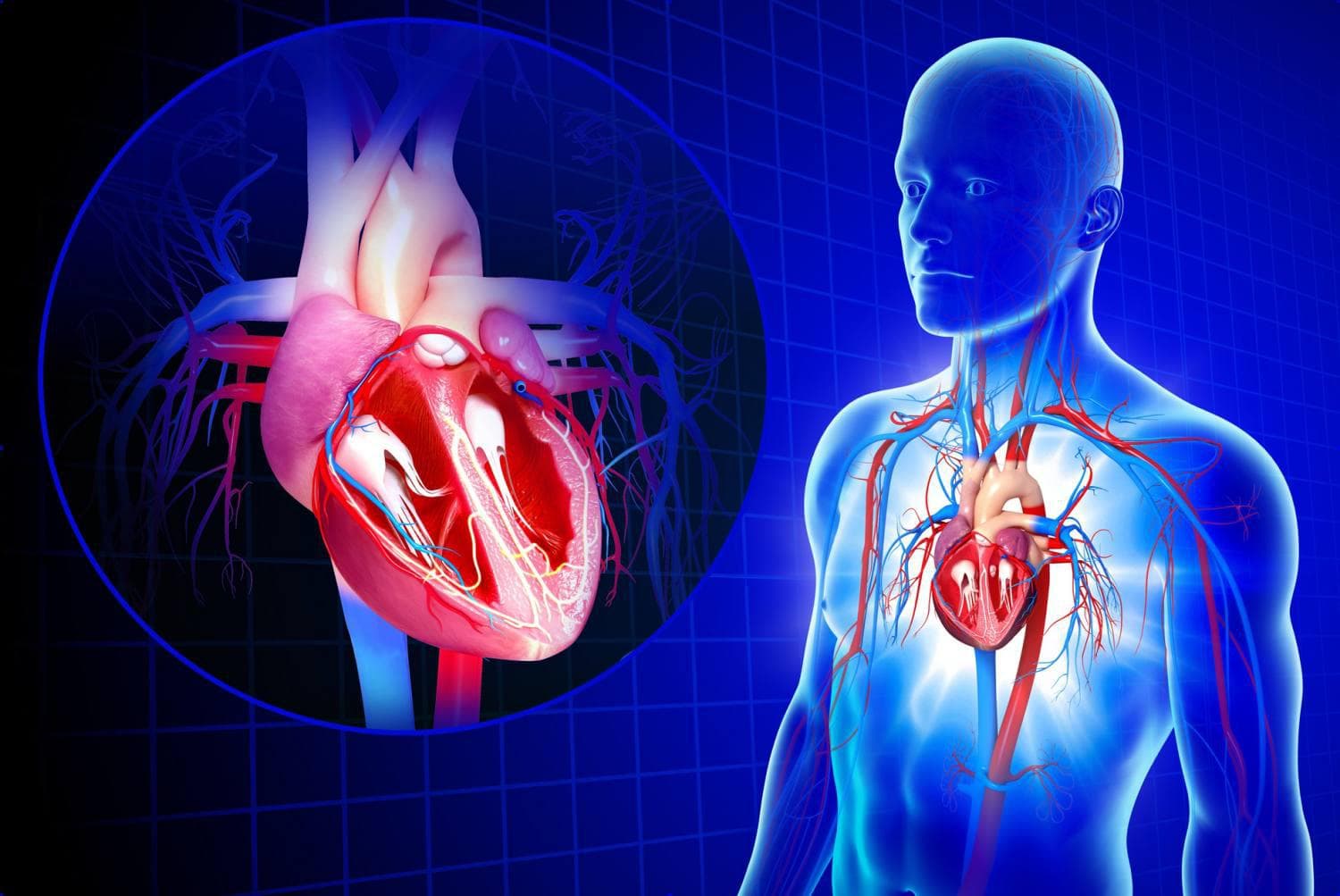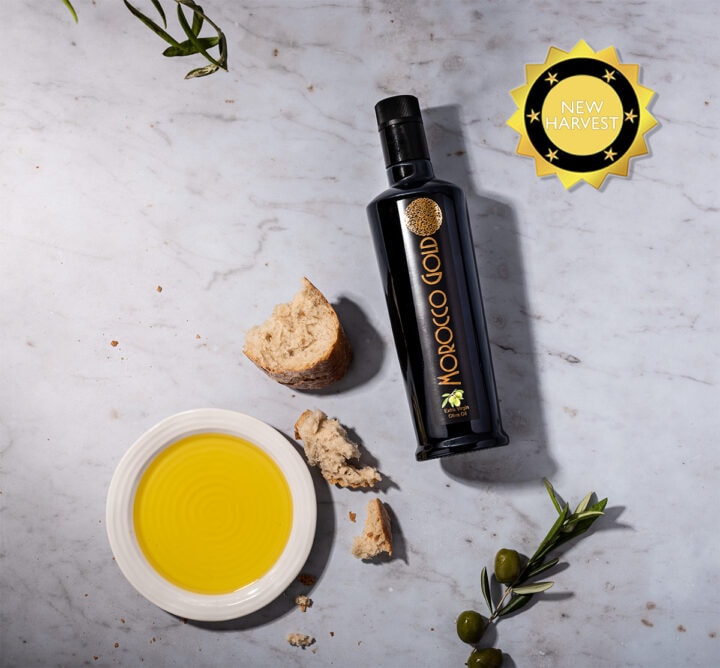How the Polyphenols in extra virgin olive oil help to protect against heart disease – a further health benefit of best olive oil.
Updated July 28th 2024

Summary
- Some easily achievable steps towards improving your cardiovascular fitness and keeping your heart healthy.
Contents
- Extra Virgin Olive Oil & Hearth Disease
- Take 2 Tablespoons Of Morocco Gold Extra Virgin Olive Oil Per Day.
- Polyphenols: The Magic Ingredient Of The Best Olive Oil
- What is the best Extra Virgin Olive Oil to fight CVD?
- The Polyphenols In Morocco Gold Extra Virgin Olive Oil
- Polyphenol 3,4 DHPEA-EDA
- What This Polyphenol Does : It’s Role In Combatting CVD
- The Endothelium, Blood Vessels and Endothelial Cells
- In Summary
1/ Extra Virgin Olive Oil & Hearth Disease
There is no shortage of research showing the direct link between our diet, cholesterol levels, weight and heart disease. But did you know there was a superfood in your larder that can help keep your heart healthy in multiple different ways?
If you want to take some easily achievable steps towards improving your cardiovascular fitness, stock up on the best olive oil you can find.
With the ever-increasing popularity of Plant-based, Mediterranean or Keto diets, choosing the best extra virgin olive oil is a versatile and vital component of many of these nutritional choices. There are many ways to incorporate it into your daily routine but here we shall focus on the simplest:
2/ Take 2 tablespoons of Morocco Gold Extra Virgin Olive Oil Per Day
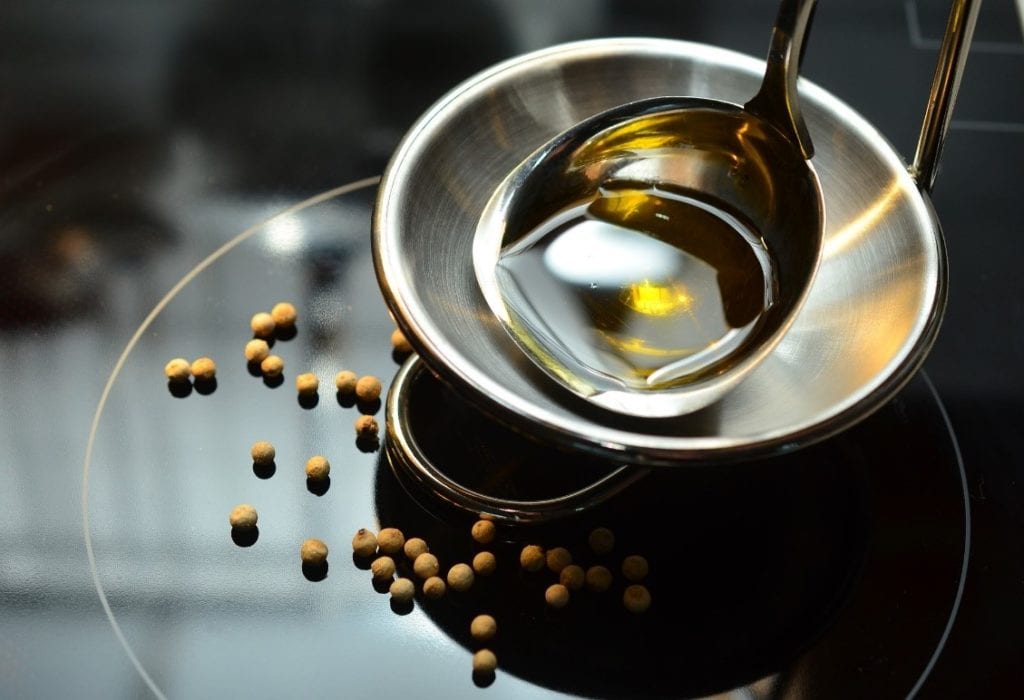
By incorporating two tablespoons of Morocco Gold Extra Virgin Olive Oil into your daily eating habits – whether first thing in the morning or last thing at night – you can be sure of giving your heart an injection of disease fighting superpowers with minimal fuss.
Many people the world over include this in their daily routine just as they might brush their teeth or apply moisturiser. They enjoy the hit of flavour that comes from the best quality extra olive oil, like Morocco Gold – with its distinctive unfiltered, unblended taste like no other.
With the newest harvest from our source in the foothills of the Atlas Mountains available from March, Morocco Gold is packed with a higher concentration of Polyphenols than ever before.
3/ Polyphenols: The Magic Ingredient Of The Best Olive Oil
Extensive research has been conducted on the phytonutrient composition of olive oil, revealing a remarkable array of beneficial compounds. Among these, polyphenols are highly praised for their potent health benefits. The number of polyphenols found in Morocco Gold Extra Virgin Olive Oil is truly astounding, contributing to its superior antioxidant properties. This high polyphenol content not only enhances the flavor but also supports heart health, reduces inflammation, and protects against various chronic diseases.
We are delighted to announce that this year’s harvest has yielded an exceptional extra virgin olive oil with a remarkably low acidity level of just 0.2%. Additionally, we are proud to report the highest polyphenol content we have ever achieved. This combination results in a superior quality olive oil that promises outstanding flavor, enhanced health benefits, and a rich, robust profile. Our commitment to excellence and meticulous attention to detail in cultivation and production have truly paid off, ensuring that our customers receive only the finest olive oil available.
Extensive research from various perspectives indicates that incorporating Extra Virgin Olive Oil into our daily diet, even in modest amounts like one tablespoon per day, can significantly reduce inflammation within our blood vessels. This anti-inflammatory effect of Extra Virgin Olive Oil is attributed to its rich content of polyphenols and antioxidants, which help to protect the endothelium, the inner lining of blood vessels. By mitigating these inflammatory processes, regular consumption of Extra Virgin Olive Oil can effectively lower the risk of developing inflammation-related cardiovascular diseases, including atherosclerosis. Atherosclerosis, characterized by the buildup of plaques in the arterial walls, can lead to serious health complications such as heart attacks and strokes.
Yet anti-inflammatory benefits are not the only cardiovascular benefits provided by Extra Virgin Olive Oil. Two other broad types of heart-related benefits are well documented for this oil. The first type is lessened risk of forming unwanted blood clots. While blood clotting is a natural and healthy process required for the healing of wounds and prevention of excessive bleeding, clotting in the arteries can ultimately result in a heart attack or stroke.
One significant risk factor for unwanted clotting in our arteries is the excessive clumping together of platelet blood cells, a process known as “aggregation.” This clumping can lead to the formation of dangerous blood clots, which can obstruct blood flow and result in serious health issues such as heart attacks and strokes. Research has shown that regularly incorporating Extra Virgin Olive Oil into one’s diet can reduce the risk of this excessive platelet aggregation. The beneficial compounds found in Extra Virgin Olive Oil, such as polyphenols and oleic acid, are believed to contribute to its anti-aggregatory properties. These compounds help to maintain the proper function of platelets, preventing them from clumping together excessively. Consequently, researchers have referred to Extra Virgin Olive Oil as an “anti-aggregatory” oil, highlighting its potential to improve cardiovascular health and prevent clot-related complications.
The other broad area of cardiovascular benefits involves improved levels of circulating fats in our bloodstream, as well as protection of those fats from oxygen-related damage. Decreased levels of total cholesterol and LDL cholesterol following consumption of Extra Virgin Olive Oil are findings are the vast majority of studies that have analysed this relationship. Yet equally important, the cholesterol molecules that remain in our blood also appear to be better protected from oxygen-related damage (oxidation). Since fats and cholesterol belong to a broader technical category called “lipids,” damage to the fats and cholesterol in our blood stream is typically referred to as “lipid peroxidation.” And it is precisely this lipid peroxidation process that gets reduced through incorporation of Extra Virgin Olive Oil into a meal plan.
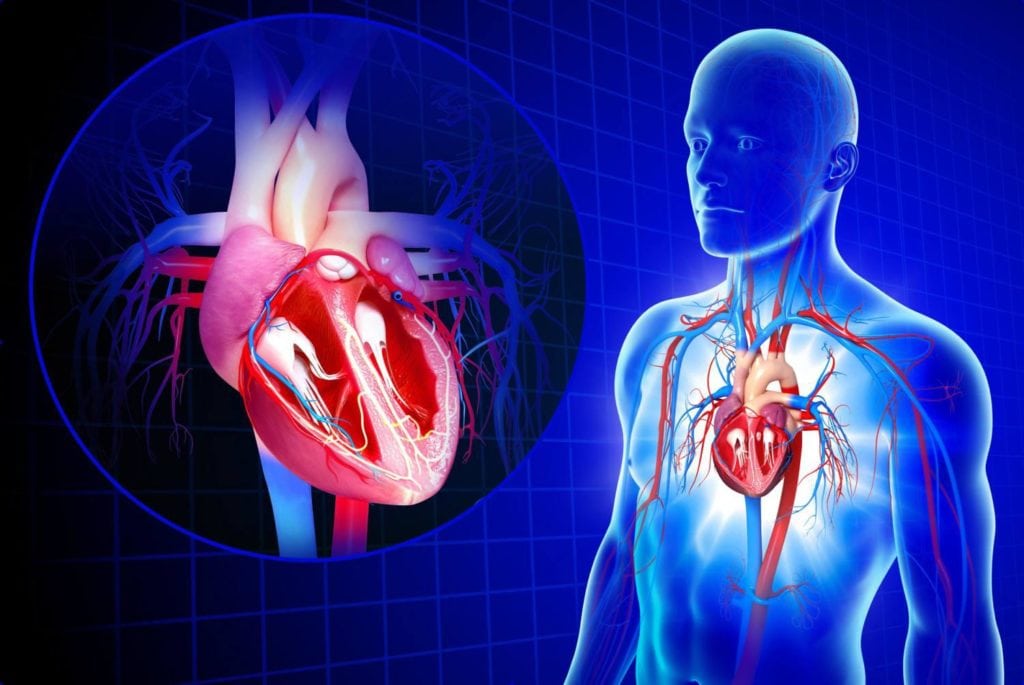
4/ What is the best Extra Virgin Olive Oil to fight CVD?
With all this convincing science out there, it’s easy to see why more of us than ever are turning to Extra Virgin Olive Oil as a must have addition to our kitchen and medicine stores. But just be sure to purchase the best quality olive oil you can source. That way, your chances of benefiting from these fabulous polyphenols is increased hugely.
Morocco Gold has no less than seven different types of Polyphenols, each of which has a unique role to play in keeping our hearts and bodies healthy.
The high polyphenol content of Morocco Gold Extra Virgin Olive Oil is influenced by three key factors. First is the variety of the olive, which plays a significant role in determining the oil’s antioxidant levels. Secondly, the climate and terroir of the growing region contribute to the unique characteristics and quality of the oil. Finally, the timing of the harvest during the growing season is crucial; olives picked at their optimal ripeness ensure the highest concentration of polyphenols.
Morocco Gold is pressed from the Picholine Marocaine, the only type of olive to go into Morocco Gold extra virgin olive oil. Oil from this variety is renowned for its high polyphenol count, oxidative stability and longevity. Thirdly, our olives are picked when the fruit is young and green.
5/ The Polyphenols In Morocco Gold Extra Virgin Olive Oil
We are delighted to say that this year’s harvest has produced a low acidity level of 0.2% together with the highest level of polyphenols yet seen in our extra virgin olive oil.
| 3,4 DHPEA-EDA | 85 mg/kg |
| Hydroxytyrosol | 5 mg/kg |
| Lignanes | 26 mg/kg |
| Ligstroside aglycone (p, HPEA-EA) | 20 mg/kg |
| Oleuropein aglycone (3,4 DHPEA-EA) | 71 mg/kg |
| Oleocanthal p, HPEA-EDA | 65 mg/kg |
| Tyrosol | 372 mg/kg |
| Polyphenols Total | 644 mg/kg |
This confirms the ongoing high quality of this rare, delicious tasting extra virgin olive oil from this wonderful new source, together with its health enhancing qualities from its high polyphenol count.
6/ Polyphenol 3,4 DHPEA-EDA
3,4-DHPEA-EDA is a polyphenol in the family of Tyrosols. It is synonymous with 3,4-DHPEA-Elenolic acid Di-Aldehyde and Oleuropein-aglycone di-aldehyde. It’s chemical formula is: C17H20O6.
7/ What This Polyphenol Does : It’s Role In Combatting CVD
Diets in which fat is significantly provided by extra virgin olive oil have been associated with a low incidence of cardiovascular diseases. In this study the anti-inflammatory effect of 3,4-DHPEA-EDA on the endothelium was examined.
This study was based on the production of the proinflammatory chemokine CCL2, following in vitro stimulation of primary human endothelial cells. Pre-treatment of cells with 3,4-DHPEA-EDA resulted in a dose dependent inhibition of CCL2 secretion.
The effect of 3,4-DHPEA-EDA on CCL2 expression was observed at the transcriptional level. Functional data have shown that 3,4-DHPEA-EDA diminished monocyte adhesion to HUVECs. These results point on the use of 3,4- DHPEA-EDA as a novel drug aimed to prevent or reduce inflammation of endothelium.
Source: Researchgate.net
8/ The Endothelium, Blood Vessels and Endothelial Cells
Almost all tissues depend on a blood supply, and the blood supply depends on endothelial cells, which form the linings of the blood vessels. Endothelial cells have a remarkable capacity to adjust their number and arrangement to suit local requirements. They create an adaptable life-support system, extending by cell migration into almost every region of the body.
Endothelial cells form the barrier between vessels and tissues. They control the flow of substances and fluid into and out of a tissue. An impaired function can lead to serious health issues throughout the body. Endothelial cells line blood vessels and lymphatic vessels, they are found exclusively in vascularized tissue.
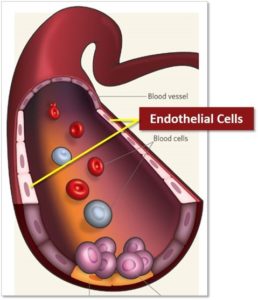
Endothelial cells, found almost everywhere in the body, are vital for maintaining our health. These remarkable cells are responsible for extending and remodeling the intricate network of blood vessels that nourish every tissue and organ. Without the dynamic activity of endothelial cells, the process of tissue growth and repair would be impossible. They ensure that our body’s tissues receive the oxygen and nutrients they need to heal and regenerate, making them indispensable to our well-being.
However, there are two major instances where dysfunction of endothelial cells is involved in pathogenesis of a medical condition. First, in coronary artery disease, endothelial cells are damaged. So, the generation of new vascular cells to restore organ function following a myocardial infarction is of high research interest. Another example is atherosclerosis, where endothelial dysfunction arising from chronic inflammation within the arterial wall causes a pathological change of blood vessels.
9/ In Summary
For millennia, the beneficial roles of natural plant polyphenols in the human body have been well-documented. These powerful compounds, found in fresh fruits, vegetables, and certain processed plant foods, contribute to various health benefits, including antioxidant properties, anti-inflammatory effects, and the potential to reduce the risk of chronic diseases. Consuming a diet rich in these foods supports overall well-being and promotes long-term health by combating oxidative stress and protecting cells from damage.
Polyphenols have been reported to reduce morbidity and slow down the progression of cardiovascular, neurodegenerative and cancer diseases.
Oleuropein, hydroxytyrosol, and their derivatives are polyphenolic compounds that are abundant in olive oil. They are powerful antioxidants displaying anticancer, anti-angiogenic and anti-inflammatory properties.
Increasing the consumption of virgin olive oil and other plant products rich in polyphenolic compounds, particularly in populations with traditionally low olive oil intake, will undoubtedly yield numerous and diverse health benefits. These benefits include enhanced cardiovascular health, improved cognitive function, and reduced inflammation. Polyphenolic compounds also possess strong antioxidant properties, which help protect the body from oxidative stress and cellular damage.

